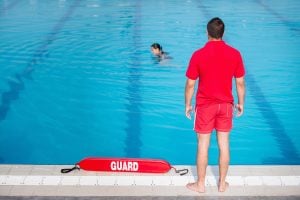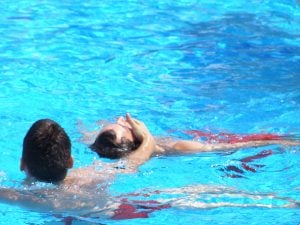Lifeguard training is underrated in how difficult it is. Of course, you will need to gain a lifeguarding qualification –the National Pool Lifeguard Qualification (NPLQ). The truth is, the test you need to pass to gain your NPLQ is intensive. It requires specialist training in order to be successful.
You’ll find it’s devised into three sections: First Aid training, a pool test, and a verbal test. All three assess different skills and test the potential lifeguard in their physical and mental capabilities.

To prepare for this test, there are many types of official course you can take, which range in length, cost, and teaching method. Often, the choice comes down to doing an intensive 5-day course or a weekly course lasting 5 weeks. All courses should assess and either pass or fail you immediately on the final day. However, some official courses may differ entirely. Some may come with the promise of a job at the end of the course, and some may include different pricing plans. Despite these minor differences, all the courses will focus on training very similar abilities, and cover much of the same content. After all, they are all leading up to the same test!
Of course, your choice of course will certainly have an impact on how easy you find this test, so pick one that works best for you. You will need to look at which official courses are on offer in your local area, to see what your options are. No matter which course you choose, however, you will be given a NPLQ folder which contains huge amounts of useful information and will be the basis of your teaching/revision. Reading this makes for a great starting point.
So, let’s get into this blog, in which the process is broken down for you alongside tips and advice!
Firstly, why you should start lifeguard training.
- Lifeguard jobs are generally better paid than working as a waiter in the same institution.
- Generally, a lifeguard is physically inactive for most of their shift and the work on the whole isn’t physically straining.
- The work is usually in a more interesting environment than other jobs and people are usually in a better mood.
- There is usually a free membership to a gym, club or at least a pool.
- There is usually paid training monthly.
- Pools are never usually open at very early in the morning or very late at night.
- You can work as a lifeguard at university and it is common to be able to work at home and at uni.
- Free Halloween costume.
Secondly, things to consider before starting lifeguard training.
- Downsides to becoming a lifeguard is that the training required to become one takes time and money.
- The course itself costs around £250 and takes time with no guarantee of success. There are certain things you can do to make this cheaper or even free but we’ll cover that later.
- Punctuality is very important to everywhere that hires lifeguards as it is law they must supervise the pool at all times.
- The course can be very hands on.
- You need certain requirements to start the course.
What is needed to start the lifeguard training course:
- You need to be 16+.
- Must be able to jump, much preferably, dive into deep water. There are many different entrances to the pool that you may be asked to do, being comfortable getting into the water in an active way is key.
- Swim 50 meters, two lengths of an average pool, in 60 seconds. This sounds the most challenging but for the average swimmer this isn’t too challenging. However if you haven’t swam in a while going for a small training swim is recommended.
- Swim 100 meters continuously, at your own pace, on front and back in deep water. This is essential, proving that you are comfortable in the water
- Tread water for 30 consecutive seconds
- Surface dive to the bottom of the pool. Can vary course to course and different institutions require different standards.
- Climb out of the pool unaided and with ease.
These things aren’t checked before you start the course, but will be examined as you go. Passing is impossible without being able to fulfil these requirements.
Hopefully the requirements don’t seem too challenging.
What you’ll need to be able to do and be by the end of your Lifeguard training course:

- First Aid trained, CPR will be examined. Other things like responding to choking or patching wounds can be assessed.
- Tow people out of the pool, they may be much bigger than you if you’re unlucky. There are three tows or carries that you may be asked to perform, they vary in difficulty and are more beneficial to different weights and sizes.
- A verbal exam – you’re required to get every question correct. However, slack is given and the examiner is usually lenient and doesn’t require a perfect copy of what you’ve been told.
lifeguard training Course details:
Two types of course:
- Intensive: 5 days of one week 9-5 with the test on the final day.
- Weekly: 9-5 once a week, usually Sunday, with a test on the last day.
Picking a course type is personal and dependent on how you learn and your schedule. It is advisable, however, to do the intensive. There is lots of information to take on, lots of ice to break, and in an intensive course you have a better chance of retaining the information, the fitness, and mentality to get the pass. Moreover, in one week it’s over and you can move on, ideal for school holidays.
There are some courses that offer a defibrillator training and some that don’t, an employer won’t turn you away if you don’t have training on this – they can train you quite easily. Having defibrillator training is another feather in your cap, and it is recommended that you do a course with this option if it’s available.
What to bring to the lifeguard training course:
- Change of clothes.
- Towel, two if you can afford the space.
- Swimming trunks (preferably skin-tight ones and worn under clothing at the start of the day)
- Spare clothes to jump in with again the tighter the better as there will be less drag.
- Food, usually get a lunch hour and can snack.
- A pen.
TOP lifeguard training TIPS
It’s easy to say, but try to break the ice with your group; you’ll be practising and examining with them so building rapport and helping each other could help you across the line to pass. Eat lunch with the group and try and include everyone in conversations and potential group activities. Bringing a football, deck of cards or a game to the course is a good plan to achieve this.
Don’t be afraid to ask questions, most of the time people are thinking the same thing and its never good to have confusion, especially as a lifeguard. Most of all if you feel uncomfortable with anything then have your say and make sure you don’t do anything you don’t want to.
CPR is always awkward at the start but just go in with confidence and make sure you really nail it by the exam, most likely you will practise every day. However, it is paramount that you have it all 100% in your head as it is such a huge part of the course. Also, don’t eat anything smelly if you are going to do CPR later that day.
How to handle employers and tips for interviews
If you’re looking to get employed somewhere after and you already have a place in mind, contact them and make sure that the course you’re on is sufficient. Moreover, the place you may wish to apply may offer their own course and have their own requirements. For example, they may have a 3-meter diving pit. This would mean you’d need to prove you could reach the bottom of it with no problems.
If an institution itself runs a course with a job at the end, they could offer the course for free if you pledge to work with them afterwards.
However, if you already have a specific place in mind, you should check exactly what the job description and the day to day is – some have ended up signing up for a ‘lifeguard’ job only to find themselves cleaning more than lifeguarding. To make sure this does not happen to you, ask a lifeguard who is currently working there what their job entails! All in all, make sure you know exactly what you’re letting yourself in for.
Lastly enjoy it, it’s a week or weekends of swimming and learning. You need to fully commit, as you’ll be constantly retested on the knowledge you have gained during a lifeguarding job. So, trying to enjoy it as much as possible will enhance your learning and only serve to benefit you in the long run.
For the interview after you have finished your lifeguard training, see here for helpful resources how to pass an interview for helpful resources.
Follow us on Facebook!
My name isGeorge. Lifeguarding Training class I like to do it
Hi George,
That’s great to hear. Using the tips in our blog, you are definitely in with a good chance of becoming a lifeguard! Why not apply for a role, and let us know how you get on?
Best of luck,
The How2Become Team
Can I wear swimming goggles on exam ? I am gone do my course and exam in uk
Hi there,
You would need to speak directly to the employer for this information – but likely yes, as this is an important safety element.
Sincerely,
The How2Become Team
Hey my name is Lucian Palm and i would really like to become a lifeguard.What does it take as i have no experience and would like to gain experience.
Ive always wanted to become a lifeguard but never had the qualifications.
Hi Lucian,
The lifeguard assessment process generally involves the following: first aid training, a pool test, and a verbal test. All three assess different skills and test the potential lifeguard in their physical and mental capabilities.
Hopefully this helps! We wish you the very best.
Sincerely,
The How2Become Team
Hi was wondering where u do the course .and how to get on it ?.
Look at the red cross website. They list many places you can get certified.
Hi I would like to train as a lifeguard can I have for info I am bristol based
Hi Lola, lifeguard training courses are available throughout the UK.
Good job! Thanks for sharing your good story.
Hi! I would like to be a lifeguard but don’t have the training or qualifications. Where would be the best place to start? Are there any specific workouts I could do to train in the meantime?
Hi Carlyn, the best place to begin is to ensure you’re a strong swimmer. Improving your overall fitness will be beneficial as well as focusing on endurance training.
how old do u have to be to do it!!
Hi Maeve, the minimum age to be a lifeguard is 16 🙂
how can i swim underwater 25mlong,without breathing
i want to become a lifeguard and will commit to passing the exam.